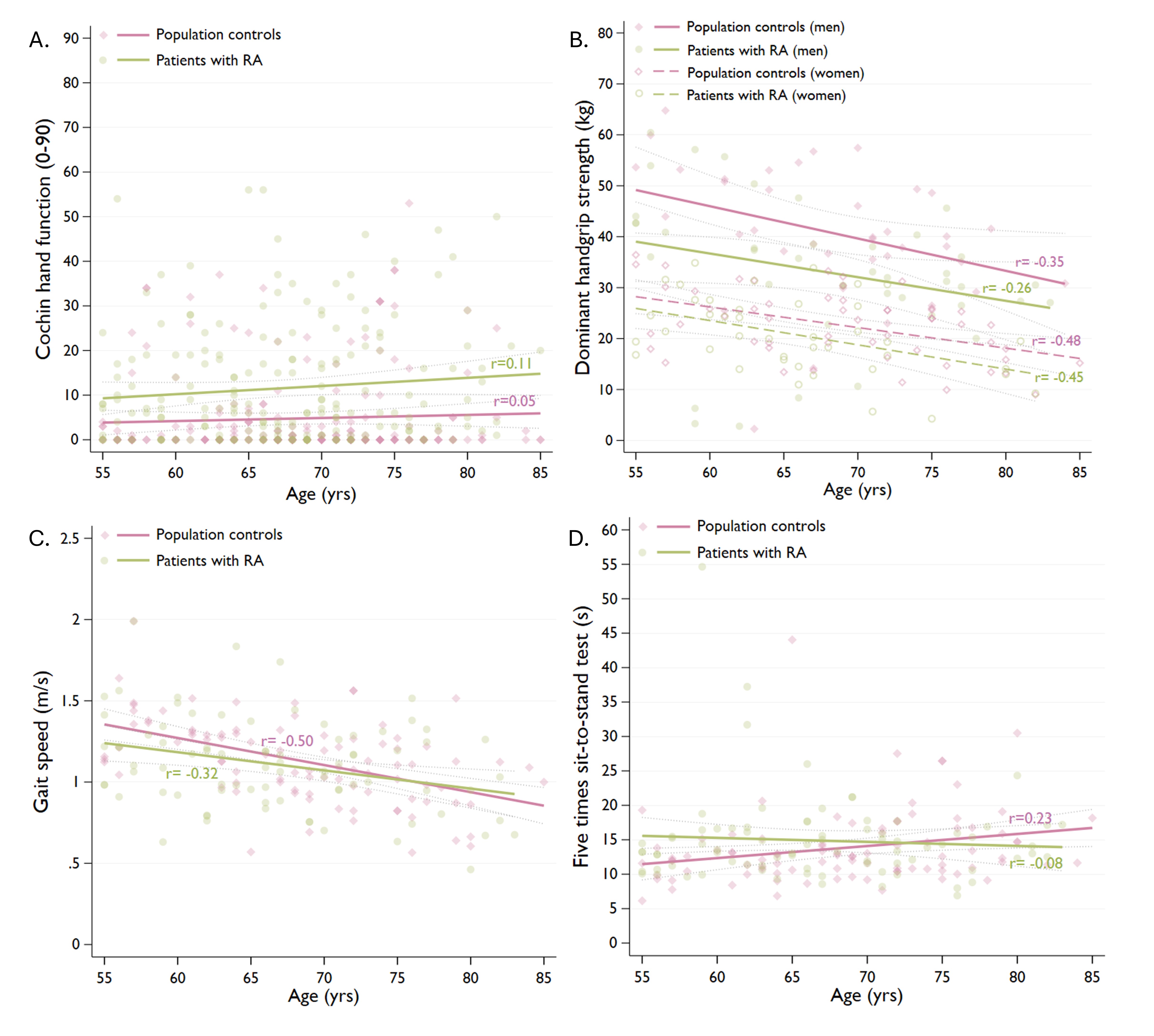Session Information
Date: Monday, October 27, 2025
Title: (1306–1346) Rheumatoid Arthritis – Diagnosis, Manifestations, and Outcomes Poster II
Session Type: Poster Session B
Session Time: 10:30AM-12:30PM
Background/Purpose: Rheumatoid arthritis (RA) may accelerate age-related functional decline compared to the general population. This study aimed to examine whether four performance measures of physical function differ between older patients with RA and population controls, and whether this decline is stronger with increasing age in patients with RA.
Methods: Cross-sectional data of patients with RA and population controls without inflammatory rheumatic disease aged 55–85 years from the STudying Aging in Rheumatoid arthritis (STAR) study was used. Physical function was assessed using four measures. All participants completed the self-reported Cochin hand functional disability questionnaire (18 items; 0=no functional hand disability, 90=maximal disability; score ≥1 = impaired). In a subpopulation, additional physical measurements were conducted: grip strength of the dominant hand measured with a dynamometer (kg; fulfilling sex- and BMI-specific Fried frailty criteria = impaired), gait speed using the four-meter walk test (< 0.8 m/s = impaired), and the Five Times Sit-to-Stand Test (FTSST) ( >15.0s = impaired). Correlations between age and outcomes of physical function were explored separately for RA patients and controls and visualized using scatter plots. Linear and logistic regressions assessed age and sex adjusted associations between group (RA vs. control) and outcome, and the interaction age*group. Due to a left-skewed distribution, Cochin scores were only analyzed using logistic regression (≥1 vs. 0).
Results: A total of 416 persons were included: 197 patients with RA (mean age 68 ± 7, 62% women) and 209 population controls (mean age 68 ± 7, 60% women). The subpopulation consisted of 168 persons: 78 patients with RA (mean age 67 ± 8, 51% women) and 90 controls (mean age 68 ± 7, 58% women). Age correlated moderately with gait speed in controls and handgrip strength in female controls, but correlated weakly for all other comparisons (Figure 1A-D). For self-reported handfunction, RA patients were more likely to report a functional disability (score ≥1) (OR=4.9, 95%CI: 3.2–7.6) (Table 1). For hand grip strength, patients with RA had lower handgrip strength (β=-4.7, 95%CI: -7.7 to -1.7) and were more likely to meet the Fried criteria for low grip strength (OR=2.5, 95%CI: 1.2–5.1), as compared to controls. For gait speed and FTSST, no associations with RA were observed. A significant interaction between age and group was only observed for the Cochin scale, however, after stratification this was not considered clinically relevant.
Conclusion: These findings suggest that while RA leads to lower physical functioning compared to controls, this effect does not differ across age. Functional decline in RA may be more disease-specific than age-driven, highlighting the importance of early management of RA. The results may also indicate that current RA treatment may be effective in limiting excessive functional decline later in life, by reducing cumulative joint damage over time.
A) The Cochin hand function scale by age, stratified for population controls (n=209; r=0.05) and patients with RA (n=197; r=0.11)
B) Observed dominant handgrip strength (kg) by age, stratified for population controls (men: n=38; r=-0.35, women: n=52; r=-0.48) and patients with RA (men: n=39; r=-0.26, women: n=38; r=-0.45)
C) Gait speed (m/s) by age, stratified for population controls (n=90; r=-0.50) and patients with RA (n=78; r=-0.32)
D) Five times sit-to-stand test (s) by age, stratified for population controls (n=90; r=0.23) and patients with RA (n=78; r=-0.08)
To cite this abstract in AMA style:
Truijen S, Boonen A, Ramiro S, van Onna M. Physical Function Across Age in Patients With Rheumatoid Arthritis and Population Controls: A Cross-Sectional Study of Four Performance Measures [abstract]. Arthritis Rheumatol. 2025; 77 (suppl 9). https://acrabstracts.org/abstract/physical-function-across-age-in-patients-with-rheumatoid-arthritis-and-population-controls-a-cross-sectional-study-of-four-performance-measures/. Accessed .« Back to ACR Convergence 2025
ACR Meeting Abstracts - https://acrabstracts.org/abstract/physical-function-across-age-in-patients-with-rheumatoid-arthritis-and-population-controls-a-cross-sectional-study-of-four-performance-measures/


.jpg)